In clearing officers, Sacramento County district attorney built a case against an unarmed homicide victim
Gray walls, gray carpet, gray faces. Sleep- and stress-puffed eyes. A scrum of reporters pack in tight with their equipment, logging in, setting up, test-firing lenses. Sacramento County District Attorney Anne Marie Schubert stands inside the doorway, hands folded, eyes down, waiting for her cue. Somewhere through the wide, sixth-floor window is a grieving family waiting to be let down, to feel loss again.
On March 2, nearly one year after two Sacramento police officers turned a corner in a Meadowview backyard and opened fire, Schubert made the announcement many expected: She would not file criminal charges against Officers Terrence Mercadal and Jared Robinet for killing Stephon Clark while he stood in his grandparents’ backyard with only a cellphone in his hand.
The news was both anxiously awaited and widely predicted.
Clergy leaders, community activists, legal and public health professionals, and city officials had convened for weeks inside City Hall to discuss how best to respond to and channel the anger from Schubert’s impending decision. Sometimes an emotional venue to speak openly about historical trauma, the Friday meetings were a tacit acknowledgment that many in Sacramento expect only rubber-stamp endorsements of deadly force from its elected district attorney.
There’s a reason for that.
Since the DA’s office restarted its use of force reviews in 2014 and through 2017, it has cleared officers in 33 shootings—all on Schubert’s watch. (The office has yet to release its findings in four officer-involved shootings from 2017 and, except for the Clark case, it hasn’t finished reviewing any officer shootings or in-custody deaths from 2018.)
But in trying to shift the narrative that she is swayed by anything other than the evidence, Schubert went too far, relatives and activists say, by disclosing text messages, internet searches and call logs of Clark, who argued with his fiancee two days before his March 18, 2018, slaying.
In going to such unusual lengths to interpret the thoughts of a 22-year-old black father whose only crime was breaking windows, Schubert invited condemnation from an array of family members, civil rights leaders, community activists and even journalists who had another question: Why didn’t she put the same effort into unpacking the minds of the officers who killed him?
“Instead, Stephon Clark is murdered twice,” Saad Sweilem, an attorney for the Sacramento Valley chapter of the Council on American-Islamic Relations, said later in a theme repeated in the days since. “First by the police officers who murdered him in his grandmother’s own backyard, then again today by our district attorney. She assassinated—she assassinated his character.”
High noon, moment of truth hour. Schubert takes the lectern between two flat screen monitors. She preambles. She settles expectations. She foreshadows, listing instructions for a theoretical jury that will never convene.
“We’ve done our very best to balance accuracy with compassion,” she says. “When we talk about the role of the district attorney’s office, our question in this review is limited to one question: Was a crime committed?”
She takes the long way to answering that question. She starts at the beginning, with a 911 call about a man breaking car windows. There are minor revelations. DNA and glass analysis confirm Clark was in fact the one who broke them, although Schubert stresses that he did not steal anything.
She replays the infamous videos from the Sheriff’s Department helicopter overhead and from the officers body-worn cameras. She stands silent as the gunshots pop from the screen behind her. Clark dies with her back turned.
She builds a case.
Officers’ accounts are presented as credible: Clark swore and pointed at them as if he had a gun. A spark of light looked like a muzzle flash.
Actions are imbued with meaning: Clark advanced toward officers, rather than alongside his grandmother’s house.
Legal assumptions are extended: The statements officers made after shooting Clark are “inherently reliable” because they were spontaneous—even though officers muted their body-worn cameras moments later, suggesting they knew they were being recorded.
Schubert cherry-picks evidence. She omits that Mercadal and Robinet never identified themselves as police officers during their pursuit of Clark, including when they chased and shouted and shot at him.
Schubert drops hints. She drops bombs. She veers personal. An unsubstantiated domestic violence claim two days before Clark is killed “weighed very heavily on his mind,” she says. A probation violation hung over his head. An unsent email to police denied the incident and expressed fears of returning to jail. On the phone that officers apparently believed was a gun were beseeching texts and unanswered calls to the mother of his two sons and visits to two dozen websites about suicide. Schubert reveals that Clark had alcohol, Xanax, Codeine, Hydrocone, marijuana and cocaine metabolite in his system; two of those substances are suggested as a lethal combo on one of the visited suicide sites.
“Some may wonder, especially today, why are we talking about this,” Schubert says. “Isn’t it invasive? Isn’t it disrespectful? But I’ll say it again, our job is to consider all the facts … even the ones that may be uncomfortable for us to talk about.”
She invites speculation and lets it hang: Is it possible that Clark committed suicide by cop?
Sixty-eight minutes in, Schubert closes her argument and delivers her verdict. She says what everyone expected for a year: The officers committed no crime and will not be prosecuted.
Outside the building where Schubert rests her case, people stand in near silence. Less than a minute later, protestors follow Black Lives Matter-Sacramento founder Tanya Faison and head to the Sacramento Police Department where more than 100 people decompress for hours.
Inside, reporters begin their cross examination. They ask whether the DA’s office was as thorough excavating the officers’ personal lives. Schubert rubs her hands and shrugs.
“I don’t know if we received that,” she says of officers’ cellphone data.
Reporters rifle follow-ups. Schubert contradicts herself. She suggests the officers’ cellphone history is irrelevant, as the investigation only considered events directly leading up to the shooting. Reporters point out the contradiction. She deflects. Her office has “no indication there was anything that impaired these officers.”
She omits that her office has the authority to request whatever information it deems necessary to complete its review. She resists stating the obvious: Her office never bothered asking such personal questions.
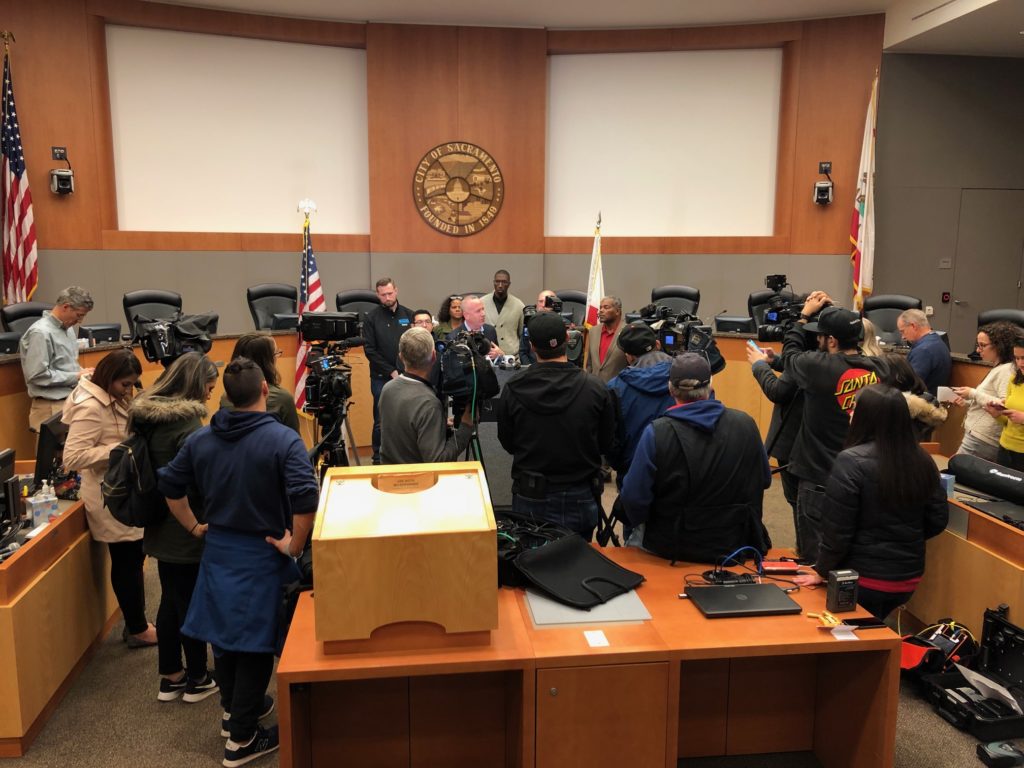
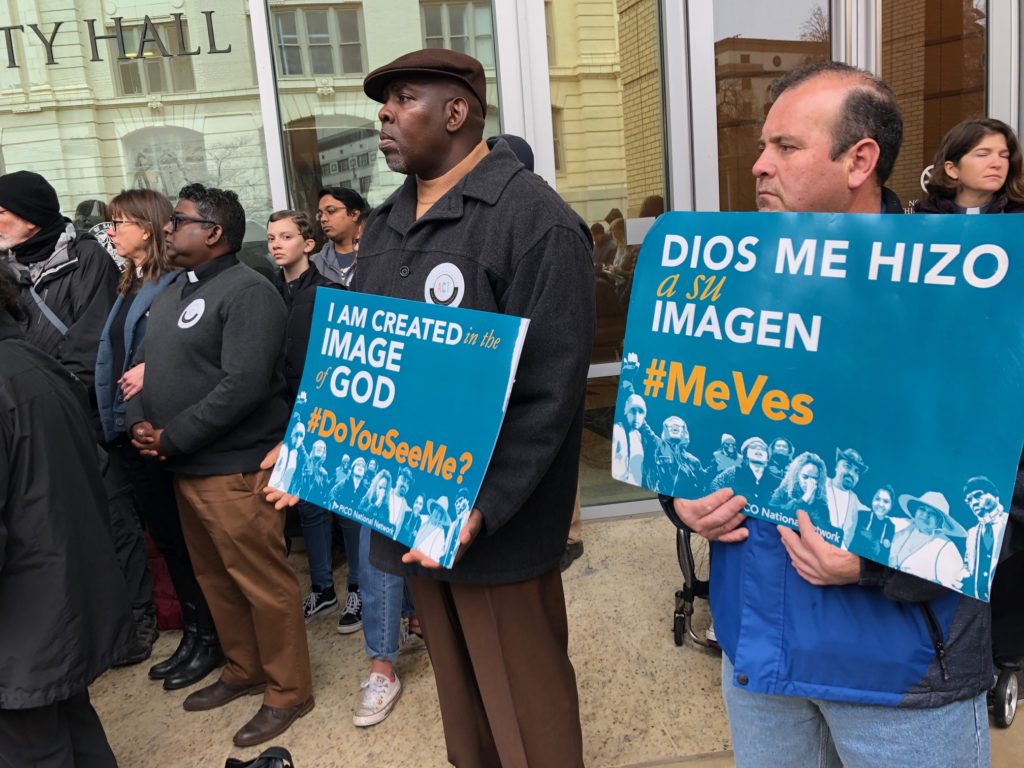
Press conferences inside and outside City Hall, and in a small church where Clark’s mother and fiancee speak.
PHOTOS BY RAHEEM F. HOSSEINI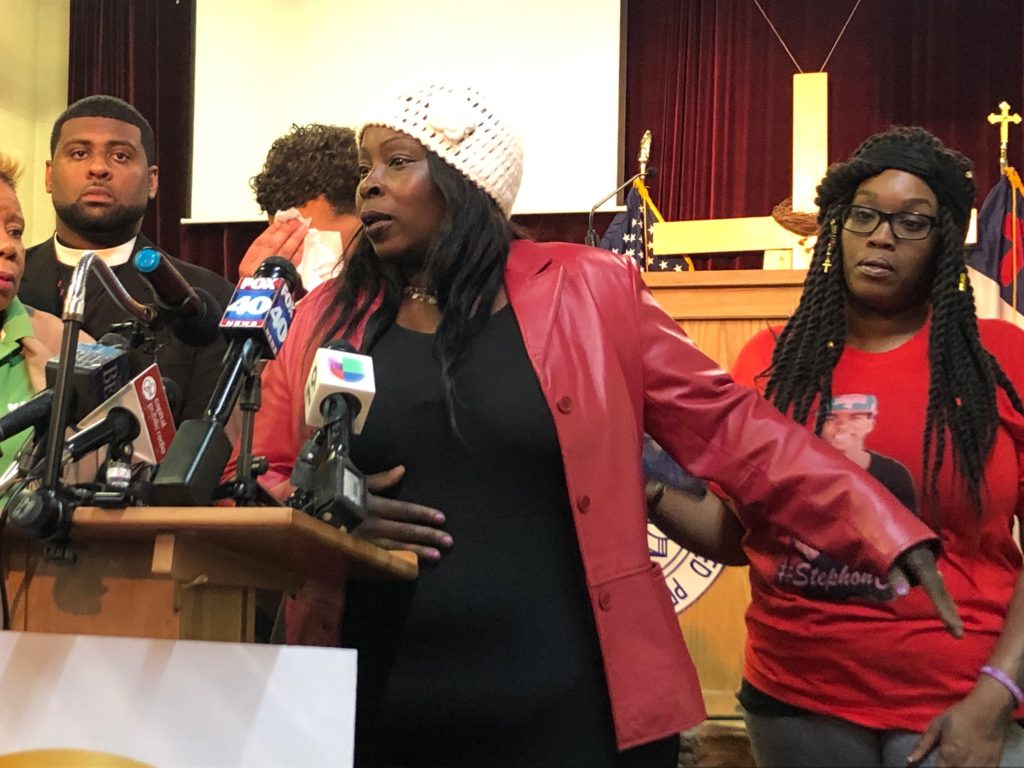
News travels. News vans and marked and unmarked police cars dot a rain-dampened downtown. A nondescript sedan idles in an alley around the corner from the DA’s office; sitting inside is a police officer in a bullet-proof vest. Cal Expo is on notice. It has agreed to act as a processing center for arrestees if civic unrest explodes, according to emails obtained by SN&R.
Both sides have been preparing for this moment. Both sides are unsure of what happens next.
Press conferences are called. Press conferences procreate. Press conferences trip over each other.
Mayor Darrell Steinberg stands at a lectern inside the City Council chambers, flanked by three council members and two faith leaders. He makes explicit what politicians have been telegraphing for weeks.
“Today’s announcement was not a surprise,” he says.
Steinberg politics. He bullet points the Police Department reforms that have already happened: its pioneering video release policy, its revised foot pursuit policy in direct response to Clark’s death. He repeats his call for a $200 million investment in “left-behind neighborhoods” such as Meadowview, where the surviving Clarks live.
Steinberg searches for the middle ground through polarizing terrain. Officers have a hard job, he says. “At the same time, they have an awesome power to take a life.”
He supports restricting that power. Assembly Bill 392, which would refine officers’ legal justification to employ deadly force, is broached. Steinberg says he supports Assemblywoman Shirley Weber’s bill in principle. Reporters press. “I support the Weber bill,” he says. “There, I said it.”
That becomes the soundbite.
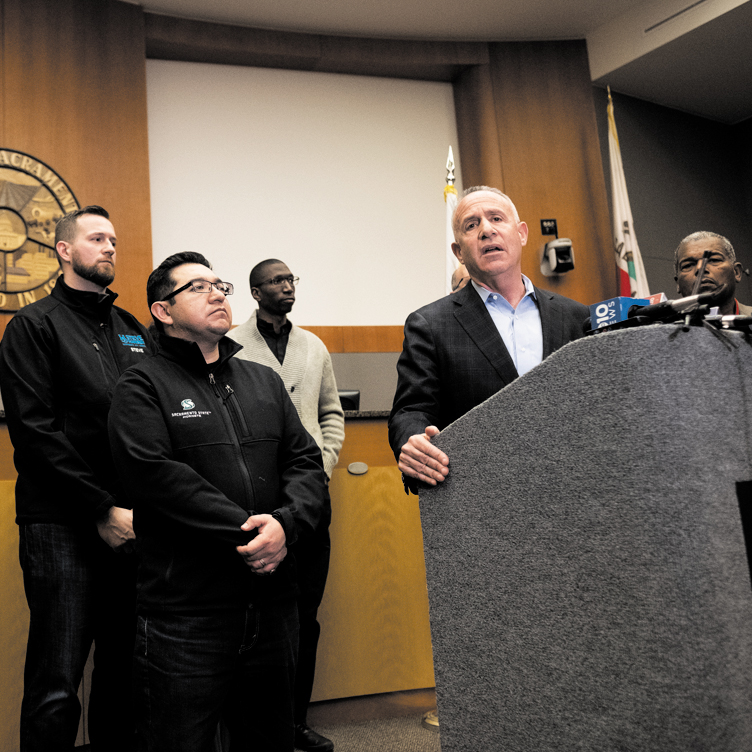
PHOTO BY KARLOS RENE AYALA
Outside City Hall, at an overlapping press conference, Pastor Les Simmons introduces a broad coalition of faith and civil rights leaders. They stand shoulder to shoulder in top coats and Sacramento Area Congregations Together buttons. They are flanked by homeless people inside and outside tents and sleeping bags and wheelchairs.
The juxtaposition is accidental. The homeless people were already here, to be dry and safe. Now they are witnesses to a laser-focused pain.
Somber-faced speakers take turns using City Hall as a backdrop to press City Hall to do more than what’s being offered inside: Grant a civilian police commission the power to investigate and discipline officers, they urge. Force the department to reform its use of force policies, they demand. Don’t wait for the legislative churn, they say. Fire the officers who shot Clark. Don’t let them police our communities. Don’t let them make another deadly mistake.
“The last time I checked, the legal consequences of breaking windows is not execution,” says Rev. Elizabeth Griswold, co-pastor of Parkside Community Church, United Church of Christ. “It is not facing a firing squad in your grandmother’s backyard with no trial. This is not how our system is supposed to work for anyone.”
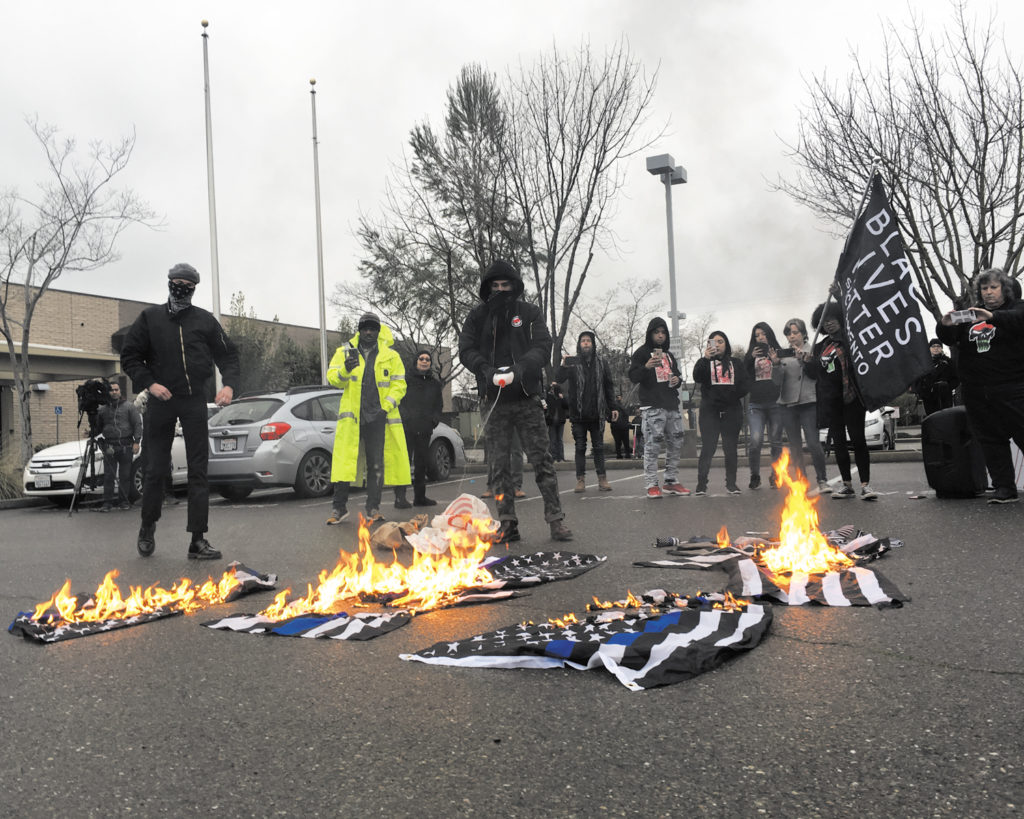
PHOTO BY DAVE KEMPA
At police headquarters, Chief Daniel Hahn tells reporters that any disciplinary action against the officers won’t be decided until after Attorney General Xavier Becerra releases the results of his investigation. On Tuesday, Becerra announced he won’t file criminal charges against the officers, dashing the hopes of reformers who want his Department of Justice to take use of force reviews away from elected DAs.
Unlike Schubert, Becerra doesn’t dredge up Clark’s personal affairs. Like Schubert, the A.G. deflects reporters’ questions about how robust his office’s “independent” review actually was and whether he found it problematic that officers never identified themselves before pulling the trigger on Clark. Becerra also won’t take a position on AB 392, though he wonders aloud if the status quo is sustainable.
He stands beside a table with massive case-file binders. He works an analogy. He says, “We must all be willing to write the next chapter of what we call American justice.”
Afterward, the U.S. Attorney’s Office and FBI announce they’re revieweing whether police violated Clark’s civil rights before firing 20 rounds at him. It’s lukewarm comfort for the family. Like the DA and the A.G. before them, the federal review will largely rely on the police investigation into the shooting. Fruit of the biased tree.
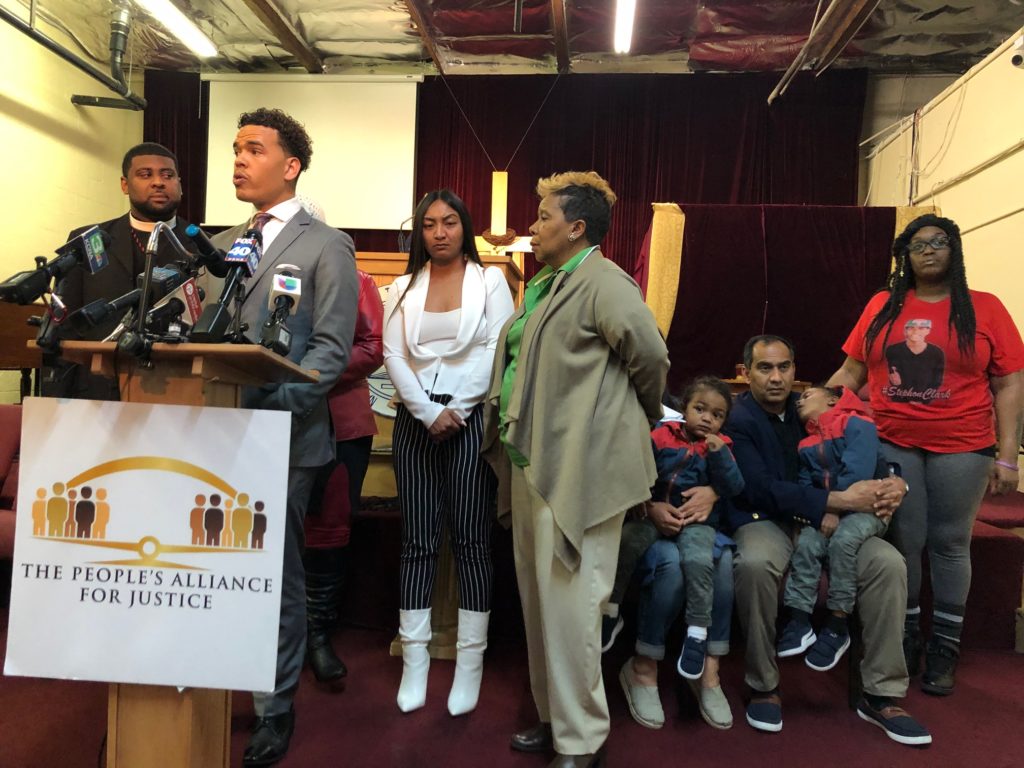
PHOTO BY RAHEEM F. HOSSEINI
Darkness falls. “Safe zones” created by city officials in the weeks leading up to the DA’s announcement struggle on short notice to attract youth. At the Oak Park Community Center location, Tasha Johnson with the Greater Sacramento Urban League says at most 12 young people came in around 2 p.m. The scene at the Max Baer Park safe zone is similar, and the Urban League location was closed at least an hour before the expected 8 p.m. time. “We’re hoping that more youth and families come in throughout the week as the news sets in,” Johnson says.
Even though the Clark family anticipated the DA’s decision, it’s staggered by the toll. Clark’s grandmother Sequita Thompson is taken to a hospital with shooting chest pains. The news re-broke her heart. Family friend Jamilia Land goes with Thompson. Thompson’s disabled husband stays at home.
Clark’s girlfriend Salena Manni is on her way from Los Angeles to Harmony Church on Second Avenue to speak publicly for the first time. Greater Sacramento NAACP president Betty Williams says Manni reached out about three weeks ago, deciding it was time for her voice to be heard. But Manni didn’t know the DA would divulge personal details of her relationship to Clark. She learned that on the flight to Sacramento, says the Rev. Shane Harris, national president of the People’s Alliance for Justice, who escorts her here.
The one-story church is intimate. Manni is joined by her parents, Clark’s mother and the two sons Manni had with Clark. Manni’s father holds her older son Aiden, 4, who sleeps through the emotion-wracked event. Younger son Cairo, 2, looks at the strange people snapping photos of him. His eyes are wide and wondrous.
Manni comes to the microphones and sobs. She gathers herself and reads a prepared statement. It’s articulate. It recites the talking points of the day. Use this profound travesty, transform and channel it, pass AB 392 to prevent more unarmed black men from dying. She leaves the lectern. She returns to it. She has more to say. She puts down her prepared remarks and speaks from her heart.
“What I feel the DA announced today was not about what happened on March 16th, was not about what happened on March 17th, it was about what happened on March 18th, when the officers murdered my fiancé, murdered Stephon Clark,” she weeps. “That’s what this is about. It’s not about anything that happened before that. It’s about the officers who murdered him. Murdered him because he had a cellphone.”
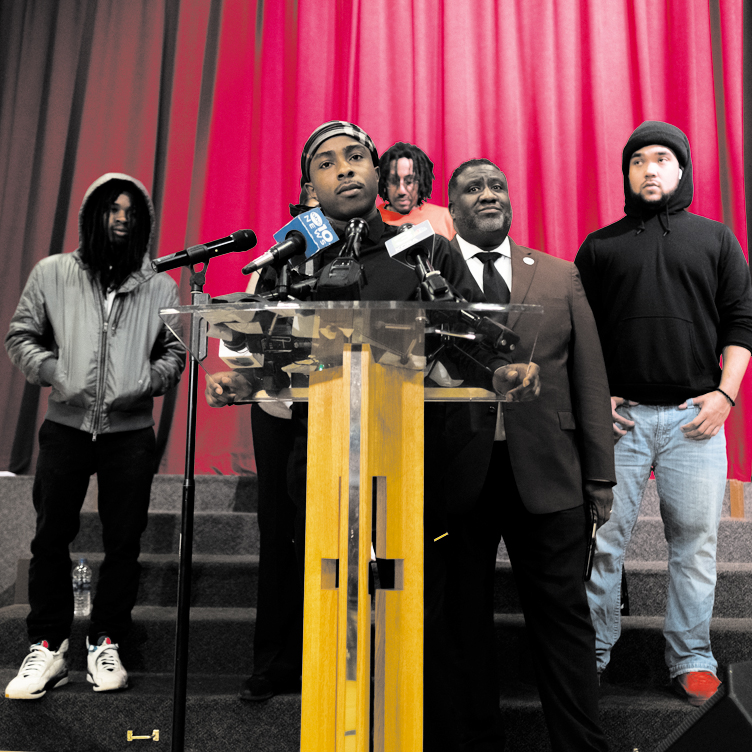
Stevante Clark, brother of Stephon, says Sunday that his family will continue fighting for justice.
PHOTO BY KARLOS RENE AYALA
Morning comes. It’s Sunday. Stephon Clark was killed on a Sunday. His older brother Stevante resurfaces in the afternoon, for a press conference at Genesis Church in Meadowview. The one-year anniversary looms. Stevante outlines the family’s plan for a “legacy weekend,” beginning March 15. So much will happen on the way to that day—sit-ins and shutdowns and mass arrests and still more press conferences. Still so much left to be said about a man dead too soon.
“Stephon is more than just protest,” Stevante says in a calm voice. “Stephon is legislative change. Stephon is communities being united. Stephon is … dreams being fulfilled, not just a kid who died in his grandmother’s backyard.”
Additional reporting by Scott Thomas Anderson, Karlos Rene Ayala and Kris Hooks.

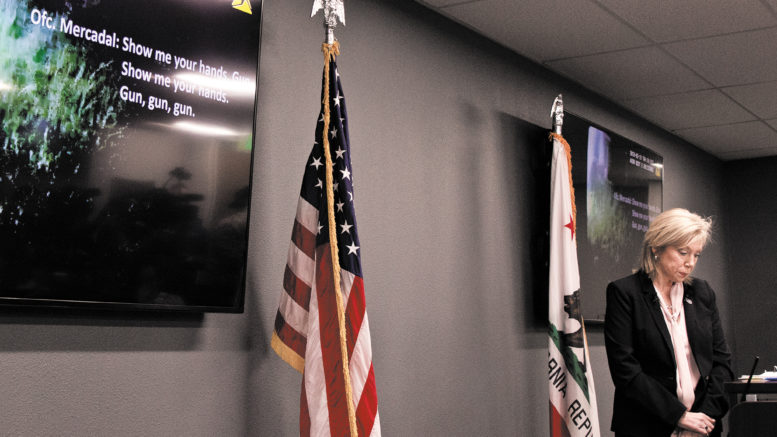
Leave a comment